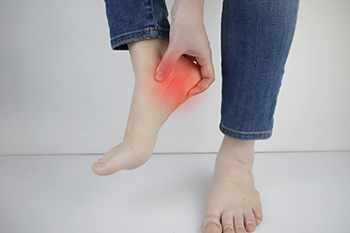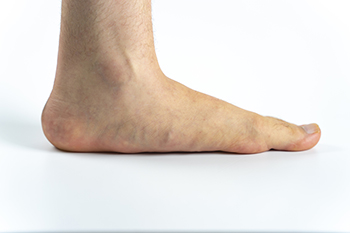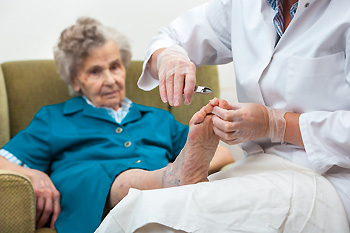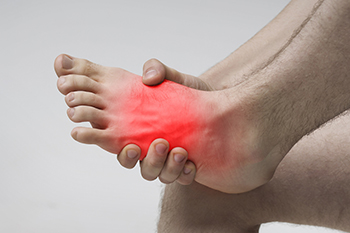Connect With Us
Blog
Items filtered by date: June 2022
Arthritis Can Cause Pain in the Feet and Ankles
What Can Cause Plantar Fasciitis?

Plantar fasciitis develops as a result of an inflamed plantar fascia, which is the band of tissue that connects the heels to the toes and runs along the bottom of the foot. The fascia can become irritated for several reasons. These include obesity, standing on hard surfaces for long periods of time, and wearing shoes that do not fit correctly. Research has indicated that cases of plantar fasciitis have increased during the pandemic. This may be a result of more people walking or running outside on uneven surfaces when the gym was closed. Additionally, it is a possibility that flip-flops were worn most of the day while working remotely. These types of shoes have little or no arch support, which may be a contributing factor in developing plantar fasciitis. This condition can produce uncomfortable heel pain, and mild relief may be found by stretching the plantar fascia and Achilles tendon. Many patients have found it helps to wear shoes that offer good support. If you have this ailment, it is suggested that you are under the care of a podiatrist who can guide you toward the correct treatment.
Plantar fasciitis is a common foot condition that is often caused by a strain injury. If you are experiencing heel pain or symptoms of plantar fasciitis, contact one of our podiatrists from Palm Beach Foot & Ankle. Our doctors can provide the care you need to keep you pain-free and on your feet.
What Is Plantar Fasciitis?
Plantar fasciitis is one of the most common causes of heel pain. The plantar fascia is a ligament that connects your heel to the front of your foot. When this ligament becomes inflamed, plantar fasciitis is the result. If you have plantar fasciitis you will have a stabbing pain that usually occurs with your first steps in the morning. As the day progresses and you walk around more, this pain will start to disappear, but it will return after long periods of standing or sitting.
What Causes Plantar Fasciitis?
- Excessive running
- Having high arches in your feet
- Other foot issues such as flat feet
- Pregnancy (due to the sudden weight gain)
- Being on your feet very often
There are some risk factors that may make you more likely to develop plantar fasciitis compared to others. The condition most commonly affects adults between the ages of 40 and 60. It also tends to affect people who are obese because the extra pounds result in extra stress being placed on the plantar fascia.
Prevention
- Take good care of your feet – Wear shoes that have good arch support and heel cushioning.
- Maintain a healthy weight
- If you are a runner, alternate running with other sports that won’t cause heel pain
There are a variety of treatment options available for plantar fasciitis along with the pain that accompanies it. Additionally, physical therapy is a very important component in the treatment process. It is important that you meet with your podiatrist to determine which treatment option is best for you.
If you have any questions, please feel free to contact our offices located in Boynton Beach, Palm Beach Gardens, and West Palm Beach, FL . We offer the newest diagnostic and treatment technologies for all your foot care needs.
When Flat Feet Are Problematic

Arches are incredible structures of the feet. They help absorb shock, distribute weight evenly, and balance our bodies when we stand, jump, run, and walk. The arch also provides the feet with flexibility and the leverage necessary to push off. When the arches are flattened it causes the feet to excessively roll inward when you walk, known as over-pronation. Most babies are born with no arches, but typically develop them as they grow. It is possible, however, for a person not to develop arches. One also may acquire flat feet with age, by being obese, or by suffering from damage to the tissues that help form the arch. Certain medical conditions such as arthritis, diabetes, muscular dystrophy, and Parkinson’s disease can also contribute to fallen arches. Flat feet may produce symptoms like fatigue, pain or stiffness in the feet, imbalance, gait issues, bunions, blisters, and even problems in the back, legs, and ankles. Sometimes, flat feet are asymptomatic. If your flat feet are problematic, contact a podiatrist who has a myriad of treatments to reduce symptoms and possibly even help restore the structure of the arch.
Flatfoot is a condition many people suffer from. If you have flat feet, contact one of our podiatrists from Palm Beach Foot & Ankle. Our doctors will treat your foot and ankle needs.
What Are Flat Feet?
Flatfoot is a condition in which the arch of the foot is depressed and the sole of the foot is almost completely in contact with the ground. About 20-30% of the population generally has flat feet because their arches never formed during growth.
Conditions & Problems:
Having flat feet makes it difficult to run or walk because of the stress placed on the ankles.
Alignment – The general alignment of your legs can be disrupted, because the ankles move inward which can cause major discomfort.
Knees – If you have complications with your knees, flat feet can be a contributor to arthritis in that area.
Symptoms
- Pain around the heel or arch area
- Trouble standing on the tip toe
- Swelling around the inside of the ankle
- Flat look to one or both feet
- Having your shoes feel uneven when worn
Treatment
If you are experiencing pain and stress on the foot you may weaken the posterior tibial tendon, which runs around the inside of the ankle.
If you have any questions please feel free to contact our offices located in Boynton Beach, Palm Beach Gardens, and West Palm Beach, FL . We offer the newest diagnostic and treatment technologies for all your foot and ankle needs.
Foot Cramps in the Elderly

Foot cramps are a result of the foot muscles involuntarily contracting. They are inconvenient, uncomfortable, and even painful, but they are usually not serious. One may experience a foot cramp due to dehydration, muscle fatigue, or exercising without proper stretching of the calves and feet. They may also result from a side effect of a medication or a nutritional deficiency. With age, nerves and muscles may wear out and cramping can occur. Older people are also generally less active than younger people, therefore, they may have a higher risk for these muscle spasms. Furthermore, nocturnal foot cramps may be related to a circulation disorder, which is also more common among the elderly. Wearing well-fitting, supportive shoes can help as well as massaging the feet and using cool or warm compresses when a foot cramp occurs. If you suffer from severe or frequent muscle cramps in your feet, it is suggested you consult with a podiatrist who can help diagnose the cause and provide the proper treatment regime.
Proper foot care is something many older adults forget to consider. If you have any concerns about your feet and ankles, contact one of our podiatrists from Palm Beach Foot & Ankle. Our doctors can provide the care you need to keep you pain-free and on your feet.
The Elderly and Their Feet
As we age we start to notice many changes in our body, but the elder population may not notice them right away. Medical conditions may prevent the elderly to take notice of their foot health right away. Poor vision is a lead contributor to not taking action for the elderly.
Common Conditions
- Neuropathy – can reduce feeling in the feet and can hide many life-threatening medical conditions.
- Reduced flexibility – prevents the ability of proper toenail trimming, and foot cleaning. If left untreated, it may lead to further medical issues.
- Foot sores – amongst the older population can be serious before they are discovered. Some of the problematic conditions they may face are:
- Gouging toenails affecting nearby toe
- Shoes that don’t fit properly
- Pressure sores
- Loss of circulation in legs & feet
- Edema & swelling of feet and ankles
Susceptible Infections
Diabetes and poor circulation can cause general loss of sensitivity over the years, turning a simple cut into a serious issue.
If you have any questions please feel free to contact our offices located in Boynton Beach, Palm Beach Gardens, and West Palm Beach, FL . We offer the newest diagnostic and treatment technologies for all your foot and ankle needs.
Causes of Metatarsal Pain

The long bones of the foot that connect the heel and the toes are called metatarsals. When the rounded head of a metatarsal bone is under pressure, it can become inflamed and painful with every step you take. The two main causes of this type of pain, also termed metatarsalgia, are the foot hitting a hard surface when you walk or run and faulty biomechanics of the foot itself. In many cases, the activity you are undergoing, such as running or walking long distances, or the shoes your wear may be the culprit. Pounding on pavement over long periods can bruise the metatarsals. Wearing high heels with pointy toes puts extreme pressure on these bones. Other causes include foot deformities like bunions and hammertoes that can affect your gait, being overweight, stress fractures that change the distribution of weight, and high arches. If metatarsal pain has begun to interfere with your daily life, it is a good idea to consult a podiatrist for an examination, diagnosis and options for treatment.
Foot Pain
Foot pain can be extremely painful and debilitating. If you have a foot pain, consult with one of our podiatrists from Palm Beach Foot & Ankle. Our doctors will assess your condition and provide you with quality foot and ankle treatment.
Causes
Foot pain is a very broad condition that could be caused by one or more ailments. The most common include:
- Bunions
- Hammertoes
- Plantar Fasciitis
- Bone Spurs
- Corns
- Tarsal Tunnel Syndrome
- Ingrown Toenails
- Arthritis (such as Gout, Rheumatoid, and Osteoarthritis)
- Flat Feet
- Injury (from stress fractures, broken toe, foot, ankle, Achilles tendon ruptures, and sprains)
- And more
Diagnosis
To figure out the cause of foot pain, podiatrists utilize several different methods. This can range from simple visual inspections and sensation tests to X-rays and MRI scans. Prior medical history, family medical history, and any recent physical traumatic events will all be taken into consideration for a proper diagnosis.
Treatment
Treatment depends upon the cause of the foot pain. Whether it is resting, staying off the foot, or having surgery; podiatrists have a number of treatment options available for foot pain.
If you have any questions, please feel free to contact our offices located in Boynton Beach, Palm Beach Gardens, and West Palm Beach, FL . We offer the newest diagnostic and treatment technologies for all your foot care needs.

